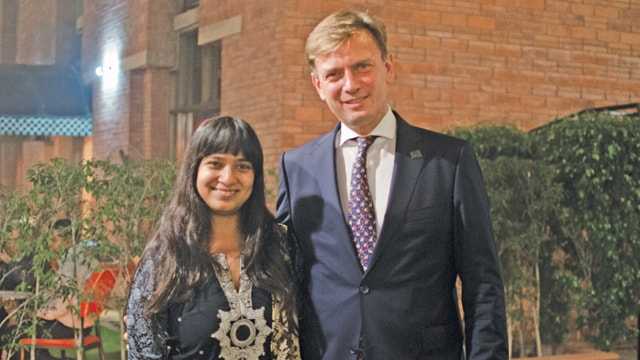
Building on 40 years of experience, the Brussels-based Foreign Trade Association has become amfori as of January this year, the leading global business association for open and sustainable trade. Bringing together over 2,100 members, retailers, importers and brands, the association provides its members a practical framework and world-class tools that enable them to manage the social and environmental performance of their supply chains and anticipate trends. Through amfori Advocacy, it advocates for progressive policy and collaborates with high-level stakeholders to achieve common aims. Christian Ewert, Director General, amfori was in India recently, and Apparel Online took the opportunity to discuss with him various issues and aspects of what makes the apparel industry sustainable. According to him, apart from other important issues related to sustainability, women empowerment and environment are key areas where Indian apparel exporters need to focus on.
The air in Delhi was bad the day the interview was conducted, due to the high-level of pollution. Taking that as an example of why sustainable initiatives are important, Christian rightly pointed out: “Saving of resources like energy and water is the biggest concern today and we all should look for ways to achieve this goal. Compressed air generation is one of the biggest energy consuming systems in the textile industry; water preservation and wastewater treatment are very important and costly. Solar energy, renewable energy, emissions to the air are some areas where apparel manufacturers definitely need to pay more attention.”

amfori BEPI was initiated four years ago in order to properly cover sustainability issues related to the environment as amfori BSCI already has strong foothold on social aspects. There are mainly 11 performance areas covered in amfori BEPI that provide companies with an environmental assessment methodology and reporting tool. Its overall system supports companies to gradually improve environmental performance in their supply chain through practical support. In January this year, amfori BEPI offered its first ever workshop in India (New Delhi) to support its rapidly growing network of over 200 producers in the country. Participants learned more about the need for environmental management in their factories and how they can use their participation in amfori BEPI to work towards continuous environmental improvement. This workshop marks the start of their environmental capacity building efforts in India, with more training planned in the future.
In the meanwhile, there are nearly 2,900 apparel export firms engaged in amfori BSCI in India and the country is now the third most important sourcing hub for amfori members after China and Bangladesh. Christian expects growth of around 30 per cent in amfori BSCI over next few years. “amfori BSCI is a continuous improvement process in which companies progress gradually over the time. We have a local team and partners that really engage in this process, providing support on daily operations and issues such as occupational health & safety, working hours, compensation or harassment,” he added. Interestingly, the most recently launched training program in India is internal auditor training for producers. This program helps them understand how social audits are conducted taking the perspective of an auditor, and to be prepared to conduct their own internal audits. “These auditors are internal consultants whose job is to identify gaps in social compliance and suggest remediation measures,” added Christian.
Suggesting the need for more focus on women empowerment to the Indian exporters, Christian says that there is significant work which India has already done, but consistency is required. “India has very powerful legislations in place like the 2013 Act which includes the Internal Complaints Committee (ICC), but as we often see in manufacturing, it is one thing to have the rule book in writing, and another to put it into practice. Procedures must be put in place in order to be able to address these complaints. As part of our capacity building efforts in the country, we plan to provide trainings to raise awareness on the 2013 Act. There are many passionate dynamic women in the factory and they are really playing an important role. Every employer needs to recognize this,” he added.
While he does not see the global apparel industry agreeing on a single common standard in the short term – like most industry experts have pointed out – he strongly believes in the positive impact of collaboration. The association has signed MoUs with other organizations, such as SEDEX, International Organization for Migration (IOM) and very recently with the German Partnership for Sustainable Textiles, formalising its commitment to achieve sustainable chemical and environmental management in the textile supply chain. “Full supply chain coverage has currently its limitations due to their complexity. But as much as consumer awareness and expectations are growing, so will our cooperation with other initiatives to serve specific purposes,” shared Christian.
Members’ joint efforts also pay off. By collaborating and monitoring their producers through the amfori BSCI platform, they avoid multiple audit duplication. In 2017 alone, 22,000 social audits were conducted in the framework of amfori BSCI, leading to savings of US $ 53 million.
Whenever there is a discussion on India and the EU, the talk eventually turns towards the long pending Free Trade Agreement between the countries. Giving his take on the same, Christian says, “I feel India is extremely busy with itself at the moment and I am not sure whether the Government has fully embraced the opportunity, especially in regards to India-European Union Broad-based Bilateral Trade and Investment Agreement (India-EU BTIA). We have not seen any action on this from India’s side. It is the stepping stone into a full-fledged Free Trade Agreement (FTA), which we can’t wait to start. We try to encourage the European Commission to at least come to an agreement at the technical level which can happen in a more informal setting. Europe, as much as India, is waiting for progress on the trade agreement. We call on the Indian Government as well as on the European Commission to revive the process and add fresh oxygen into it.”
amfori advocates for progressive policy on trade and sustainability and collaboration with high-level stakeholders to achieve social, environmental and economic progress. “Our strapline, trade with purpose, really expresses what we are all about. We support open and sustainable trade; we believe in a world where all trade delivers social, environmental and economic benefits for everyone,” he concluded.
Ewert is maintaining a strong relation with India as he will visit India in February to speak at the 7th Global Economic Summit on Global Value Chains hosted by World Trade Centre in Mumbai.

Post a Comment